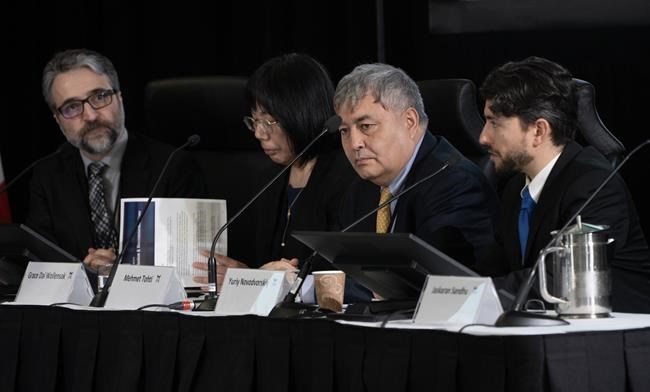OTTAWA — Members of diaspora communities told a federal inquiry Wednesday of the ways that authoritarian governments make life extremely difficult for families when members dare question the regimes.
The federal commission of inquiry into foreign interference heard from a panel of representatives of various communities about the human toll meddling can take.
Many Russians who settled in Canada have parents or other relatives who remained behind, said Yuriy Novodvorskiy of the Russian Canadian Democratic Alliance.
Russian diplomats in Canada use video surveillance and social media to identify people who engage in protest against Moscow, he said.
"We've had cases where Russian activists have been identified here in Canada, and then police initiate some sort of harassment actions against their family back home."
In other cases, members of the Russian community might be denied access to consular services, meaning they cannot renew travel documents or ensure they still have valid status as visitors to Canada, he said.
Human rights activist Hamed Esmaeilion said members of the Iranian community in Canada wear masks, sunglasses and hats at rallies so they cannot be identified.
"There are reports that when they travel to Iran, cell phones get confiscated, they get persecuted, interrogated, their family members in Iran are under pressure," he said.
"We have had members who met Canadian Parliament members here, and their family members in Iran have been pressured or have been interrogated," added Esmaeilion, representative of the Association of Families of Flight PS752, a jetliner shot down by Iranian officials shortly after takeoff from Tehran in 2020.
Most of the passengers were bound for Canada, including 55 Canadian citizens and 30 permanent residents.
Prime Minister Justin Trudeau told Parliament in September there were "credible allegations" of Indian involvement in the killing of Sikh independence activist Hardeep Singh Nijjar, who had been wanted by India for years and was gunned down in June outside the B.C. temple he led.
Canada subsequently expelled an Indian diplomat, and India followed suit by kicking out a Canadian representative.
India is a hostile state, and the Sikh community is facing the brunt of the hostility, said Jaskaran Sandhu, appearing on behalf of the Sikh Coalition.
Mehmet Tohti of the Uyghur Rights Advocacy Project indicated that Beijing's repression of community members takes place on a routine basis.
Tohti said Uyghur Canadians have told him of not being able to share news of a joyful event with family back home because communication is blocked.
"You cannot send a text to them, you cannot call them and you cannot share photos," said Tohti, adding some Uyghurs in Canada don't know if family members are alive or dead.
He spoke of the Chinese government making arrests for communicating with people abroad or withholding travel documents.
Ottawa has said there are credible reports of human rights violations against Uyghurs and others in the Xinjiang region, including mass arbitrary detention, forced separation of children from their parents, and suppression of religious and cultural practices.
Grace Dai Wollensak, a representative of the Falun Dafa Association of Canada, described Ottawa municipal officials making an effort to scale back protests outside China's embassy. For example, they asked that protesters hold smaller signs due to complaints, she said.
Her voice broke as she recalled telling bylaw officials they were going against Canadian values. "You are restricting freedom of expression in Canada, in assisting of the Chinese Communist Party," she recounted.
Commissioner Marie-Josée Hogue, head of the foreign interference inquiry, emphasized Wednesday that the need for secrecy about the sensitive subject has not hindered her work to date.
She cautioned, however, that the inquiry must walk a very fine line in balancing confidentiality and the desire for transparency.
The latest hearings, which run through April 10, will focus on possible interference by China, Russia, India and others in the last two general elections.
The inquiry expects to hear from dozens of people, including Trudeau and members of his cabinet, political party representatives and federal election officials.
The inquiry held an initial set of hearings in late January and early February to solicit ideas on how to publicly disclose as much information as possible.
Even so, Hogue said recently she had agreed to a federal request to present some evidence in the absence of other participants and the public.
In her remarks Wednesday, Hogue stressed that confidentiality related to national security issues has in no way impaired her ability to search for the truth.
The commission has had access to a large number of classified documents in their entirety, meaning they were not redacted to protect national security, Hogue said.
"In fact, confidentiality imperatives have so far not prevented us from doing the work we have been tasked to do," she said.
"But they do pose real difficulties as I endeavour to keep the process transparent and open. The commission must walk a very fine line in its work."
People often react with suspicion when secrecy shields information held by the government, Hogue said in French. "Yet it is undeniable that there is a strong public interest in maintaining at least some forms of government secrecy."
The initial hearings showed that withholding certain types of information may be essential for Canada to conduct activities vital to national security and international commitments, Hogue added.
The preliminary hearings also revealed that is particularly true in the area of foreign interference, since "sophisticated foreign state actors" may be engaged in collecting information about Canada and its citizens, she said.
"In this context, information that could reveal the sources of intelligence, methods of collection or the targets of investigations is particularly sensitive," Hogue said.
"The disclosure of such information to hostile actors could cause serious harm, both to Canadian citizens and to Canada as a whole."
This report by The Canadian Press was first published March 27, 2024.
— With files from Dylan Robertson.
Jim Bronskill, The Canadian Press
Note to readers: This is a corrected story. An earlier version misspelled the name of Hamed Esmaeilion.



